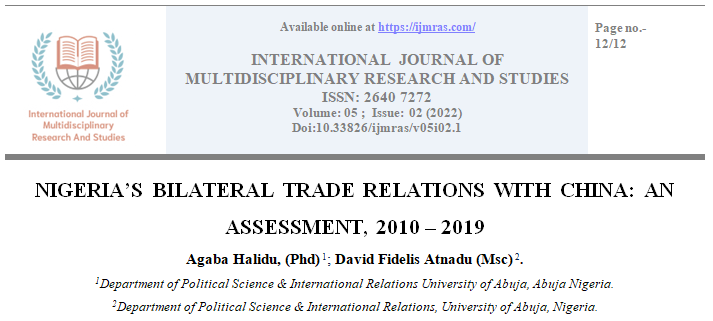NIGERIA’S BILATERAL TRADE RELATIONS WITH CHINA: AN ASSESSMENT, 2010 – 2019

Abstract
This work is an assessment of Nigeria-Sino bilateral trade relations. This assessment was done using secondary sources of data such as books, journals, newspapers, etc. Dependency theory was used to examine the trade relations between Nigeria and China to show how dependent Nigeria is on China. Nigeria needs China for finished goods and getting loans and China need Nigeria for certain raw materials but Nigeria has over time been dependent on China and this has increased the Nigerian debt burden. The study discovered that trade imbalance in the bilateral relations persisted and, that the bilateral trade relations have made Nigeria dependent on China. The study also discovered that trade relations benefited the two countries within this period and China benefited more due to the persistent trade imbalance. After seeing all these, the study made the following recommendations: Nigeria needs to invest massively in the manufacturing sector in order to close the massive gap in the economic strength between the two countries, and the two countries should do more to increase foreign direct investment (FDI), Nigeria should do more in exporting finished goods to China and this can be actualized through massive industrialization.
Keywords
Assessment, China, Bilateral, Nigeria, TradeHow to Cite
References
Agubamah, E. (2014). Bilateral Relations: Periscoping Nigeria and China Relations. European Scientific Journal, 10(14). Retrieved
from 9695-1- SM.pdf
Ndifreke, U and Orifa, J (2016) Nigeria’s Bilateral Trade Relations with China: An Assessment (1999 – 2016). International Journal of
Social Sciences and Management Research Vol. 4 No. retrieved www.iiardpub.org
United Nations Commodity Trade Statistics (UN COMTRADE) retrieved from https://comtrade.un.org/data
Adunbi, O and Stein, H. (2019) The Political Economy of China’s Investment in Nigeria: Prometheus or Leviathan? Oxford:
University Press. The diplomat ( 2016) retrieved from https://thediplomat.com/2019
Loans obtained from China Exim as of December 31, 2020, https://www.dmo.gov.ng/
Kagan, J. (2020) Bilateral Trade retrieved from https://www.investopedia.com/terms/b/bilateral-trade.asp
Tom-Jack, P. (2016) The evolving geopolitical relations of Nigeria and China. Retrieved from
https://ruor.uottawa.ca/handle/10393/34551
Punch (2019) Chinese firms handling $47bn key FG’s projects [online]. Available:
https://punchng.com/chinese-firms-handling-47bn-key-fgs-projects/
Chase-Dunn (1975) The effect of International Economic Dependence on Development and Inequality: Cross-National Study.
Retrieved from https://www.jstor.org/stable/2094176
World trade integrated system (2010-2017) world bank; Nigeria Trade Summary. Retrieved from https://wits.worldbank.org
UNCTAD (2018) “On-Line Stats”http://unctad.org/en/Pages/Statistics.aspx
Economicshelp (2019) Bilateral Trade. Retrieved from www.economicshelp.org/blog/glossary/Bilateral-trade/
Alexander. T and Verdier, D. (2013). Multilateralism, Bilateralism, and Regime Design. Department of political science Ohio State
University. Retrieved 23 August 2019.
License
Copyright (c) 2022 IJMRAS

This work is licensed under a Creative Commons Attribution 4.0 International License.
Individual articles are published Open Access under the Creative Commons Licence: CC-BY 4.0.




